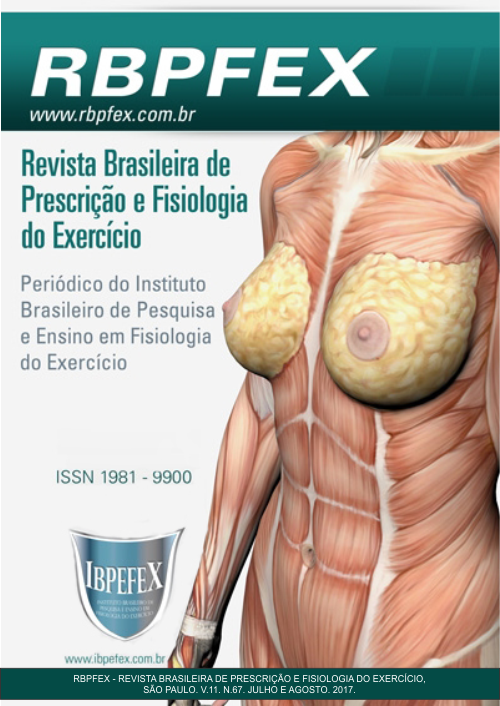Knowledge and moisture habits in athletes top 10 Brazil's 800m proof
Abstract
During intense training and after competitions, athletes lose significant amounts of fluid, which if not properly reset can result in loss of income and possible injury. This descriptive study aimed to verify the knowledge of the best athletes of middle-ground of Brazil on fluid replacement issues before, during and after competitions and training. The sample with the ten best proof of the athletes of the 800-meter dash during the Trophy Athletics Brazil. It used a standardized questionnaire with 18 objective questions related to the knowledge and practice of hydration during training and competition. The main results indicate that 80% of athletes always hidratavam during training and competition, in this case curious fact that 20% reported that they sometimes or almost never hidratavam these conditions and the most alarming of this study factor was when people were asked about the most appropriate way to hydrate, as 50% said they have no idea of how it should be carried out, 30% said they should hydrate with half a liter for every half hour and only 20% said the proper way to hydrate, which would a liter of room for a quarter of an hour. It was noticed that the athletes even being among the best in Brazil do not have the knowledge of the importance of hydration before, during and after training and competition.
References
-ACSM. American College Sports Medicine. Declaração de Princípios. Exercício e Reposição de Líquidos. Apêndice 13. 2008. p. 619-624.
-ACSM. Posição sobre “exercício e reposição de líquidos”. Medicine and Science in sports and exercise. 1996.
-Alexandrino, E.G.; Marçal, D.F.S.; Braghini, F.; Bertolini, S.M.M.G.; Abrão, C.C.; Prati, S.R.A. Conhecimento e práticas de hidratação dos principais marchadores juvenis do Brasil. IX EPCC -Encontro Internacional de Produção Científica do UniCesumar. Num. 9. 2015. p. 4-8.
-Brasil, Confederação Brasileira de Atletismo. Disponível em .Acessado em 03/04/2016.
-Brito, C.J.; Marins, J.C.B. Caracterização das práticas sobre hidratação em atletas da modalidade de judô no estado de Minas Gerais. Revista Brasileira de Ciência e Movimento. Vol. 13. Num. 2. 2005. p. 59-74.
-Cheuvront, S.N.; Sawka, M.N. Avaliação da hidratação de atletas. Sports Science Exchange. Vol. 18. Num. 2. 2006. p. 1-6.
-Dias, F.L.; Almendanha, B.R.; Malta, S.V.M.; Silva, F.S. Estudo do Conhecimento Sobre a Hidratação em Nadadores de um Clube Federado da Cidade de Lavras, MG, Brasil. Revista digital de Buenos Aires. Vol. 16. Num. 165. 2012.
-Ferreira, F.G.; Seccato, A.S.; Lima, A.S.; Coelho, R.; Segheto, W. Taxa de sudorese, consumo de líquido e nível de hidratação de tenistas amadores em etapa do campeonato brasileiro. Revista Brasileira de Prescrição e Fisiologia do Exercício. Vol. 9.Num. 51. 2015. p. 11-16. Disponivel em:
-Fuke, K.; Moro, V.L.; Gewehr, C.D.C.V.; Glaner, M. F. Estado de hidratação, peroxidação lipídica e pressão arterial em atletas amadores de ironman® 70.3. Saúde. Vol. 41. Num. 2. 2015. p. 99-106.
-Goulet, E.D. Effect of exercise-induced dehydration on time-trial exercise performance: a meta-analysis. British Journal of Sports Medicine. Vol. 45. 2011. p. 1149-1156. Disponível em:
-Gomes, L.S.; Barroso, S.D.S.; Gonzaga, W.D.S.; Prado, E.S. Estado de hidratação em ciclistas após três formas distintas de reposição hídrica. Revista Brasileira de Ciência e Movimento. Vol. 22. Num. 3. 2014. p. 89-97.
-Gouveia, G.A.L.; Pessanha, A. Nutrição, hidratação e suplementação para jogadores de futebol. Revista Brasileira de Fisiologia do Exercício. 2011. p. 166. Disponível em:
-Leão, L.; Rossi, L. Avaliação hídrica de atletas de Rugby. Revista Brasileira de Nutrição Esportiva. Vol. 5. Num. 27. 2011. p. 08-214. Disponível em:
-Maia, E.C.; Costa, H.A.; Castro Filha, J.G.L.D.; Junior, O. Estado de hidratação de atletas em corrida de rua de 15 km sob elevado estresse térmico.Revista Brasileira de Medicina do Esporte. Vol. 21. Num. 3. 2015. p. 187-191.
-Marins, J.C.B. Exercício físico e calor –Implicações fisiológicas e procedimentos de hidratação. Revista Brasileira de Atividade Física & Saúde. Vol. 1. Num. 3. 2012. p. 26-38.
-Marins, J. C. B.; Marins, N.; Villegas, J.; Zamorra, S. Hábitos de hidratação em um grupo de maratonistas. Curso Internacional sobreNutrição e Esportes. Barcelona. Anais. 1999. p. 14.
-Monteiro C. R.; Guerra, I.; Barrost. L. Hydratation in soccer: a review. Revista Brasileira de Medicina do Esporte. Vol. 9. Num. 4. 2003. p. 243-246.
-Prado, S.E.; Tavares, V.C.L.; Sampaio, V.M.T.; Barroso, S.S.; Neto, B.J.; Asano, Y. R.; Souza, C.J. Hábitos de hidratação em atletas de capoeira. Brazilian Journal of Sport and Exercise Research. Vol. 1. Num. 1. 2010. p. 16-19.
-Rodriguez, N.R.; DiMarco, N.M.; Langley, S. Position of the American dietetic association, dietitians of Canada, and the American college of sports medicine: nutrition and athletic performance. Journal of the American Dietetic Association. Vol. 109. Num. 3. 2009. p. 509-527.
-Tavares, G.R. Estratégias de hidratação antes, durante e após o exercício em atletas de elite. Revista Digital de Buenos Aires. Vol. 13. Num. 123. 2008. p. 1.
-Thomas, J. R.; Nelson, J.K.; Silverman, S.J. Métodos de pesquisa em atividade física. 6ªedição. Porto Alegre. Artmed. 2012.
-Zaar, A.; Reis, V.M. Corrida: Ciências do treino e performance. Deviant. 2016.
Authors who publish in this journal agree to the following terms:
- Authors retain the copyright and grant the journal the right of first publication, with work simultaneously licensed under the Creative Commons Attribution License BY-NC which allows the sharing of the work with acknowledgment of the authorship of the work and initial publication in this journal.
- Authors are authorized to enter into additional contracts separately for non-exclusive distribution of the version of the work published in this journal (eg, publishing in institutional repository or book chapter), with acknowledgment of authorship and initial publication in this journal.
- Authors are allowed and encouraged to post and distribute their work online (eg, in institutional repositories or on their personal page) at any point before or during the editorial process, as this can bring about productive change as well as increase impact and impact. citation of published work (See The Effect of Free Access).






